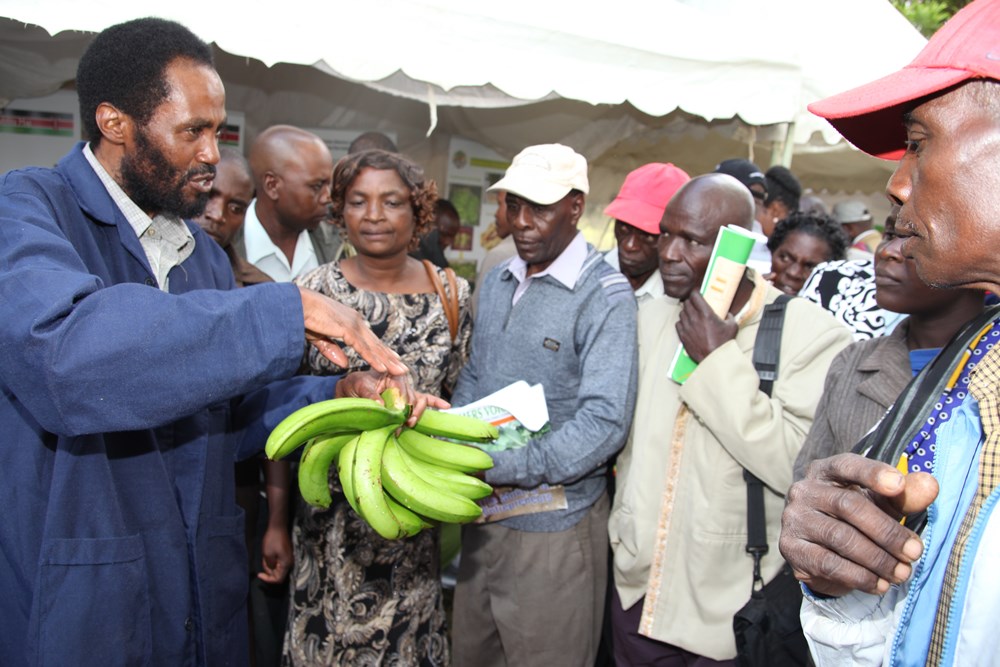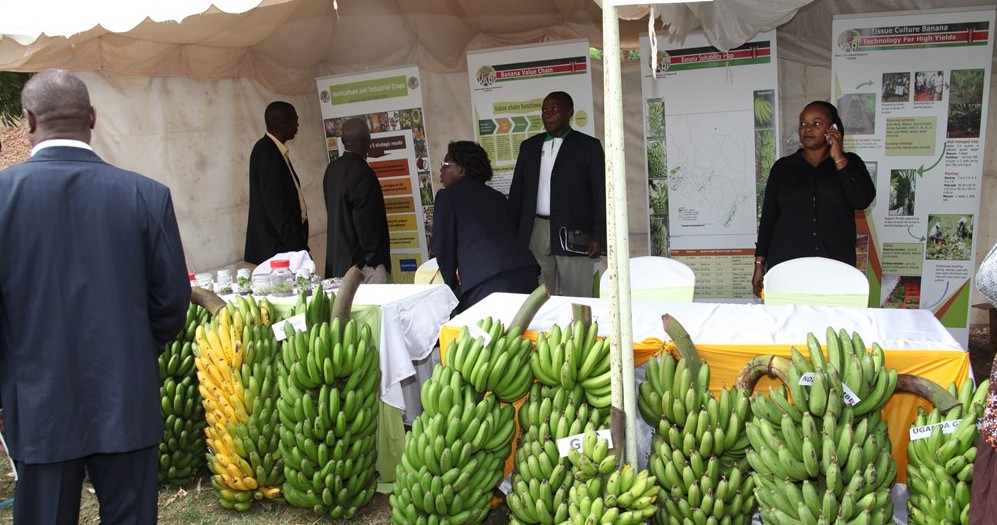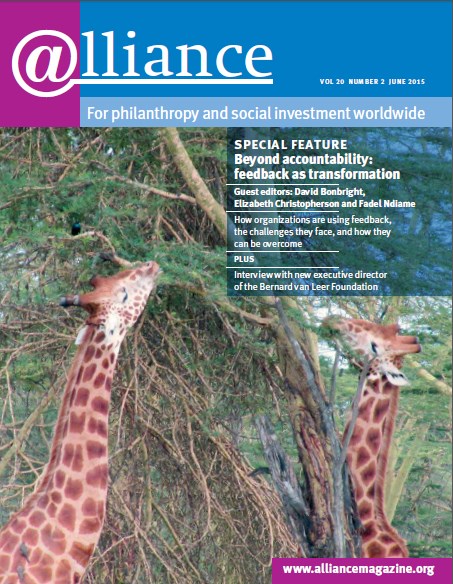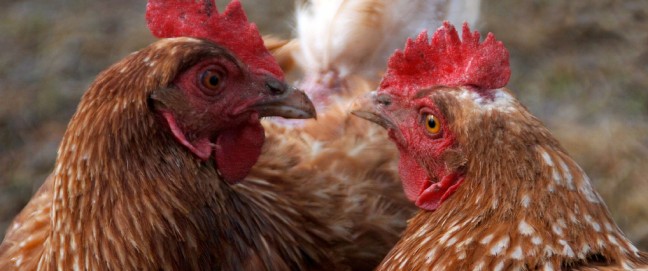The Alliance for a Green Revolution in Africa (AGRA) was founded in 2006 through a partnership between the Rockefeller Foundation and the Bill & Melinda Gates Foundation to fulfil the vision of an Africa that can feed itself, as well as make significant contributions to feeding the world – a vision that is premised on a broad-based alliance of key stakeholders, including national governments, African farmers, private sector entities, NGOs and civil society.
And yet, like many other agriculture development programmes, AGRA promotes a vision of success that is based on achieving ambitious quantitative targets such as reducing food insecurity by 50 per cent in at least 20 African countries; doubling the incomes of 20 million smallholder farmers; and developing policy and institutional frameworks that lead to sustained improvements in agricultural productivity in at least 15 African countries by 2020. Performance measurement tends to be seen in terms of progress towards achieving such quantitative targets, and most of AGRA’s work consists of professional, commercial and governmental institutions collaborating to ‘deliver services’ to farmers that are conceived and designed by researchers and delivered by NGOs and other technical institutions.
While this is clearly an important element in improving smallholder agriculture, it has tended to reinforce top-down relationships of accountability and obscure the equally important horizontal and bottom-up relationships.

Members of the Banana Growers Association of Kenya (BGAK) discussing the grades and standards required for the export market.
The accountability challenge
So, in 2010 AGRA set up the Farmer Organization Support Centre in Africa (FOSCA) to address this challenge. Its aim is to enhance access to high-quality, demand-driven, income-enhancing services by smallholders – especially women and youth – through strong farmer organizations (FOs).
Clearly, local implementing organizations should be accountable to donors on a number of issues, including whether financial resources provided were used according to contractual obligations. But they should also be accountable to those people in whose name they claim to be working as to whether their interventions are really providing what farmers need in order to achieve their shared objectives. Strong democratic FOs can help ensure that farmers themselves have a say in how success is defined, how it is measured and whether objectives are being achieved. FOs can give farmers a common voice and they can also be effective vehicles through which farmers can access services that are vital to increasing incomes and improving livelihoods.
Strong FOs can organize and provide benefits to members such as collective access to markets, finance, information, technical support services, new research and technologies, and skills building. They can also amplify farmer voices in policy debates.
Of course, weak FOs can have the opposite effect. Indeed, the history of FOs and cooperatives in Africa is a chequered one, with management often captured by self-serving and inefficient elites, accountable only to themselves.
All this means that agriculture development interventions need to address institutional development issues such as leadership and governance, strategic business models, market orientation, representation of women and youth, and management skills development.
They also need to help FO managers build and manage mutually accountable relationships with their members and other value chain partners such as input suppliers, buyers of produce, service providers, investors, financial institutions, research institutions and, of course, funders. Managing these relationships well is the only guarantee of long-term success and sustainability.
Two innovative approaches to performance measurement
FOSCA has initiated two innovative and complementary approaches to performance measurement that strengthen farmer voice and mutual accountability to shared principles and outcomes.
The Capacity Performance Index (CPI)
The CPI is a self-administered tool that helps FO leaders to reflect on and rate the organization’s capacity and performance across a number of areas. The CPI ratings give FOs a better understanding of organizational strengths and weaknesses as assessed by leaders and members themselves. They foster an organization-wide engagement in what it takes to become a sustainable business entity that delivers real value for its members, and how to go about achieving this. They can provide a useful framework for engaging with service providers and funders on organization-strengthening measures.
The CPI enables the FO to clearly assess its initial transformational challenges, which become the baseline for its organizational development partnership with FOSCA. Changes in the CPI become the standard against which the two parties can assess the effectiveness of their work. The CPI also enables AGRA and the FOs to set some acceptable benchmarks to identify the most capable FOs, and a roadmap for a possible graduation of the less advanced groups.
Constituent Voice
FOSCA is partnering with Keystone Accountability to design a system for collecting and using independent feedback about the performance of FOs from members and others in the value chain. The task of this pilot is to find a simple and affordable way to convert farmer perceptions and experience into reliable performance data in a form that can be integrated into existing performance management and M&E systems, and then to find ways of using this data to drive improvement and empower farmers.

Banana growers displaying their produce during a Banana Conference in Nairobi, Kenya on 23 October 2013.
The idea is that data will not be collected through expensive independent surveys, but as part of routine everyday activity. Farmers and local independent feedback coordinators will be trained to collect feedback using short targeted micro-surveys at selected ‘touch points’ such as market days, seedling nurseries, input suppliers’ training events, field days, AGMs, etc.
‘The idea is that data will not be collected through expensive independent surveys, but as part of routine everyday activity.’
Methods will include simple paper questionnaires and toll-free polling via mobile phones. It will involve asking a few questions frequently and as widely as possible, then using the ‘headline’ data to frame inclusive learning dialogues with stakeholders where the details can be explored and addressed.
Questions for farmers cover four main performance dimensions:
- The quality and value of FO services (eg how strongly would you recommend this service to other farmers?)
- The quality of relationships (eg how much do you trust the advice and support you receive from the FO?)
- Agency and commitment of members (eg to what extent do you believe that you can achieve your goals?)
- Emerging outcomes (eg have you been able to get a better price for your bananas because of the FO?)
It would also be possible to monitor feedback from both buyers and farmers on the value of the FO’s market service centres; from farmers on their ongoing experience with new technologies; and from FO leaders on the grant management practices of FOSCA.
This feedback can be easily uploaded into an online platform such as Keystone’s Feedback Commons, where it can inform a real-time performance dashboard.
Overall, the experience of FOSCA in developing processes that recognize the agency of its target clients and give them voice is a significant step in instituting a greater degree of accountability to the smallholder farmers that AGRA was set up to serve. The CPI and the Constituent Voice feedback mechanisms hold the promise of promoting greater accountability in rural development interventions.
Fadel Ndiame is lead coordinator of the Farmer Organization Support Centre in Africa (FOSCA) at AGRA. Email FNdiame@agra.org







Comments (0)